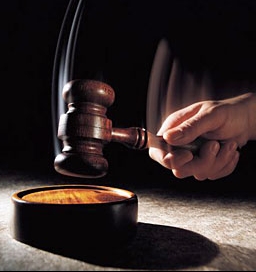It seems that the highest praise you can give someone these days is to describe them as "non-judgemental." This certainly has a source in Torah as in "b'tzedek tishpot es amischa", "hevai dan es kol ha'adam l'chaf zechus" and "al tadin es chavercha, ad she'tagia lim'komo" ("judge your people in righteousness," "judge everyone to the side of merit," "do not judge your friend until you reach his place").
However, what is often forgotten is the mitzva d'oraisa of "hochei'ach tochi'ach es amisecha" (Rebuke shall you rebuke your fellow).
Not being non-judgemental has very specific halachic rules as follows:
If at all possible, you should give people the benefit of the doubt. We must always give a pious, yirei shomayim, the benefit of the doubt, even when it seems most likely that what he did was improper.
The rules about an average mitzva observer are:
If you see them doing something that looks wrong, and the likelihood of zechus (innocence) and chov (guilt) seem equal, we should give them the benefit of the doubt.
If chov seems more likely, leave it undecided in your mind, but strictly speaking you can assume they did wrong. It's still a good thing to give them the benefit of the doubt though.
Nowhere in these halachos does it say anything about blurring good and bad! In other words, even when we are giving the benefit of the doubt, the reason we need to do so is because something looks amiss!
The Torah is very clear about right and wrong. There's no such thing as tolerance or vatranus (looking away) when it comes to right and wrong. Vatranus has to do with being personally hurt or wronged, and overlooking it.
The liberal approach of "everybody is entitled to their opinion," is not a Jewish view, unless it has to do with food preferences or similar things with no right and wrong.
Some examples from Chumash: 1) Yaakov asked the shepherds why they had stopped working when the day wasn't over yet.
2) Moshe saw two Jews fighting, and he rebuked them. Moshe didn't look away, he didn't think "live and let live," let them work it out, it's none of my business ... He judged them to be doing something wrong, and he called them on it.
The calls for unity through tolerance are misplaced and not Torah-based. We can be united despite the fact that other people are wrong, yes, wrong. Unity is not about blurring right from wrong.
Subscribe to:
Post Comments (Atom)




To me, judging favorably applies to situations where right and wrong are not issues but choices are. For example, if Mrs X, who has 3 shidduch aged children, comes to a simcha in a dress that is old, she is not a bad person or a wrong person but people might think badly of her because of her clothing choices. They might feel that she is not balabatish enough for their family. The "right" thing to do would be for her to dress more stylishly but maybe she grew up poor and doesn't like to overspend on herself or maybe she pays a lot of tuition or maybe just doesn't think that style is important. She will be judged negatively by others even though she has done nothing wrong.
ReplyDelete"The liberal approach of "everybody is entitled to their opinion," is not a Jewish view, unless it has to do with food preferences or similar things with no right and wrong."
ReplyDeleteI disagree. If someone dislikes chocolate then that's just so wrong! :-)
True! I stand corrected :)
ReplyDelete